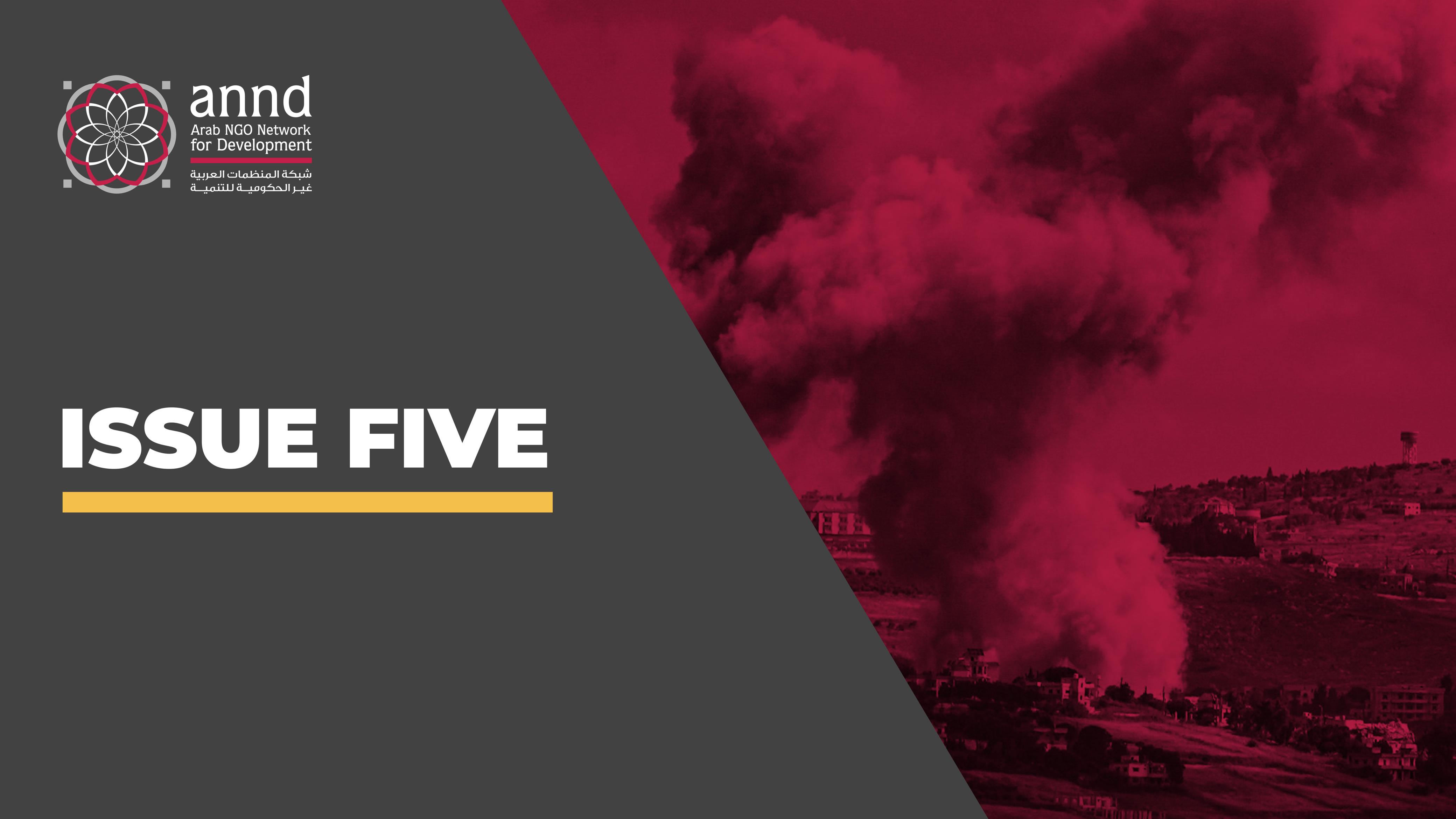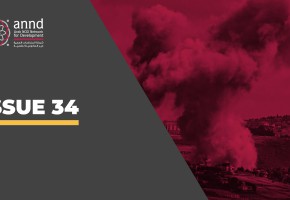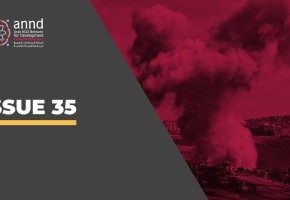A Region on Fire
Issue Five - October 1, 2024
Another Blood-Soaked Day and Dangerous Regional Developments
The Ground Invasion: A Tactic or a Broader Plan?
There is no limit to Israel's aggression against civilians in Gaza and Lebanon. On Monday night, the Israeli army announced that it had begun "limited, localized, and targeted ground operations aimed at Hezbollah infrastructure in southern Lebanon," bolstered by aerial and artillery support. This official announcement came hours after an American official stated that Israel had informed the United States that it was carrying out limited operations targeting Hezbollah infrastructure near the border. The army did not disclose the number of troops involved in this operation but said that the 98th Division, which includes paratroopers and commando units, is participating. On Monday evening, the Israeli army declared a "closed military zone" in parts of Israel's northern border with Lebanon, indicating potential ground operations.
The Israeli army claimed to have crossed into Lebanese territory dozens of times, but Hezbollah denied these claims today (Tuesday) in a statement, asserting that the allegations about an invasion of Lebanese land and direct clashes with Hezbollah forces were false. According to Hezbollah officials, these claims of entering Lebanon are untrue, and no direct ground confrontation has taken place so far.
984 Airstrikes in 48 Hours
The Israeli airstrikes on the Lebanese capital, Beirut, on Monday night and early Tuesday morning caused massive destruction. Several buildings collapsed, with scattered debris and steel remnants of structures blocking some streets, while smoke clouds continued to rise from the targeted complexes. September witnessed the highest number of Israeli airstrikes on Lebanon, reaching 1,899 strikes, bringing the total number of airstrikes to 8,350.
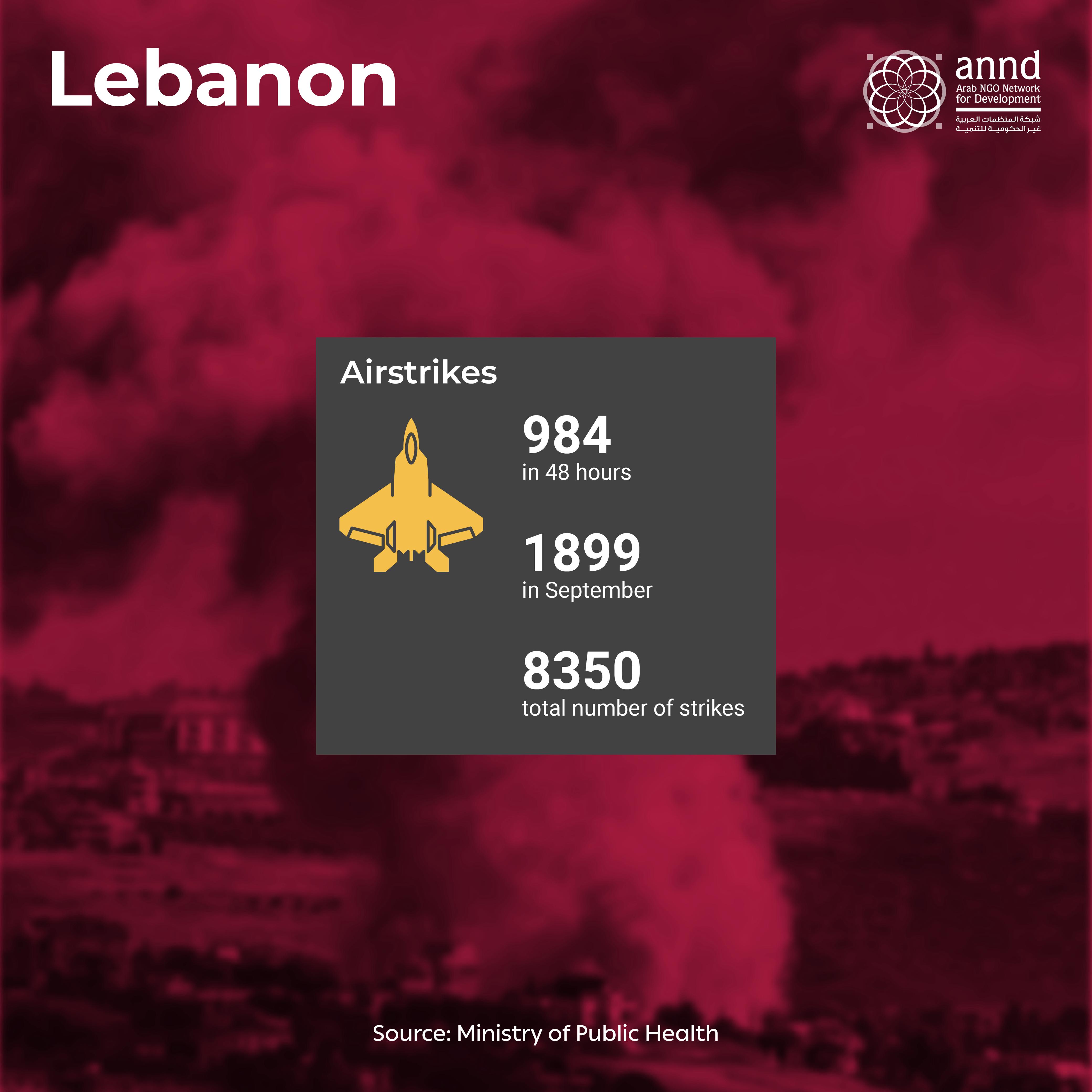
On Tuesday morning, the Israeli army warned residents of 30 border villages to evacuate toward the north of the Awali River, beyond the city of Sidon, in a significant development—outside the southern provinces of South Lebanon and Nabatieh. The infamous boundary of the former buffer zone demanded by Israel to ensure the security of its northern settlements was based on the Litani River. Could this mean that Israeli forces will advance beyond the border strip villages?
Early on Tuesday, Israel launched an airstrike on the Ain al-Hilweh refugee camp in the city of Sidon in southern Lebanon, killing six people, including three children. Israeli airstrikes continued on villages in the south, the Bekaa Valley, and the southern suburbs of Beirut. In the evening, Israeli aircraft targeted two apartments near the capital in what was described as a "precise operation" aimed at Hezbollah leader Mohammad Qasir. This was followed by a request for residents of some neighborhoods in the southern suburbs to evacuate their homes before intensive, violent, and concentrated bombardment caused significant destruction of buildings and property.
According to a statement from Lebanon’s Ministry of Health, as of 6 PM today, the death toll had reached 95, with 172 wounded. The total number of martyrs since the start of the war on October 8 stands at 1,873, with 9,134 wounded. Over the past week, at least 80 children have been killed in the attacks, with hundreds more injured.
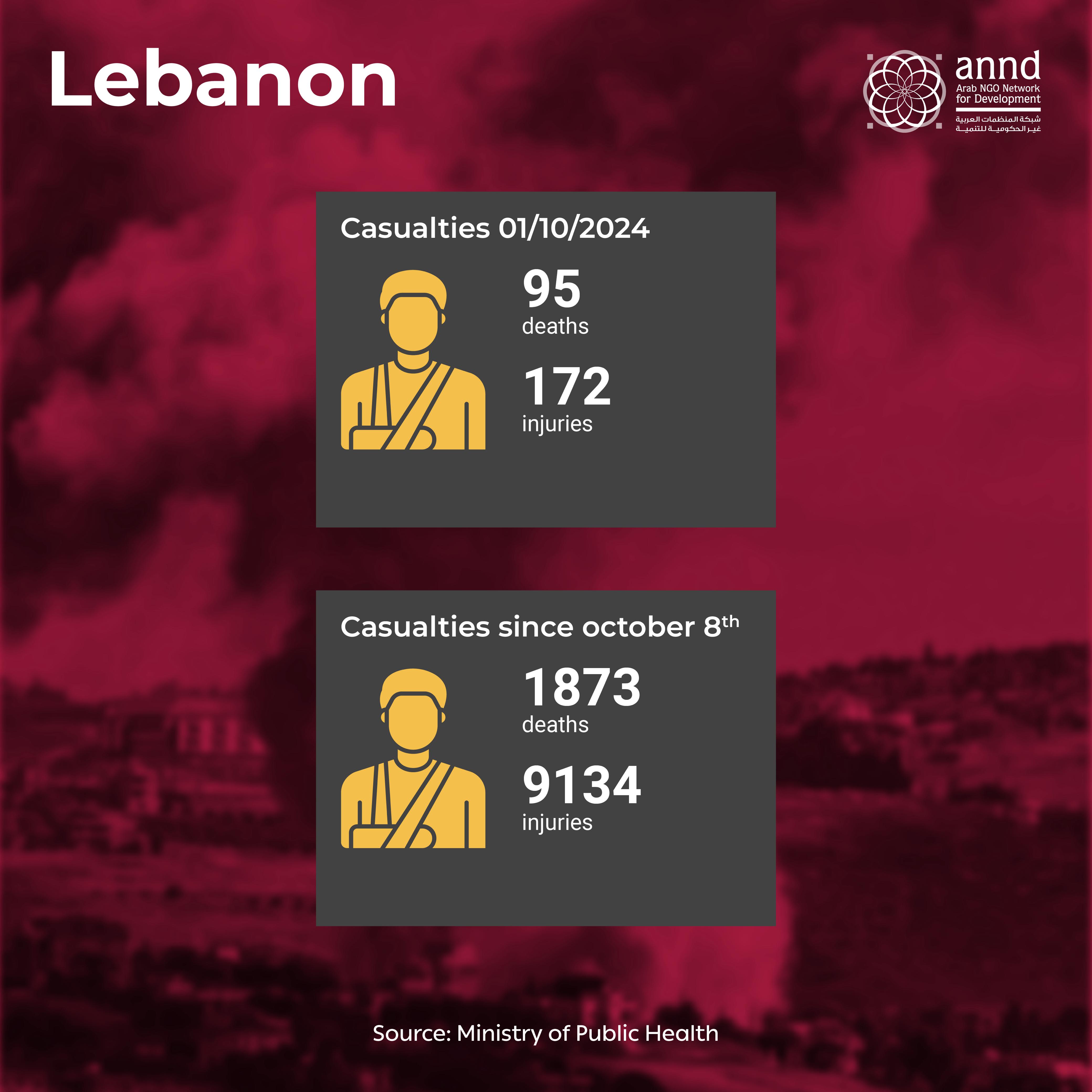
Major Deterioration in the Humanitarian Situation
According to government reports, the number of displaced persons due to the violence has risen to over a million people, including more than 300,000 children. The distribution of displaced persons in shelters by province is as follows:
Total displaced: 155,600
- Mount Lebanon: 58,800
- Nabatieh: 1,300
- North: 12,500
- South: 15,200
- Bekaa: 11,800
- Beirut: 40,100
- Baalbek-Hermel: 10,600
- Akkar: 5,300
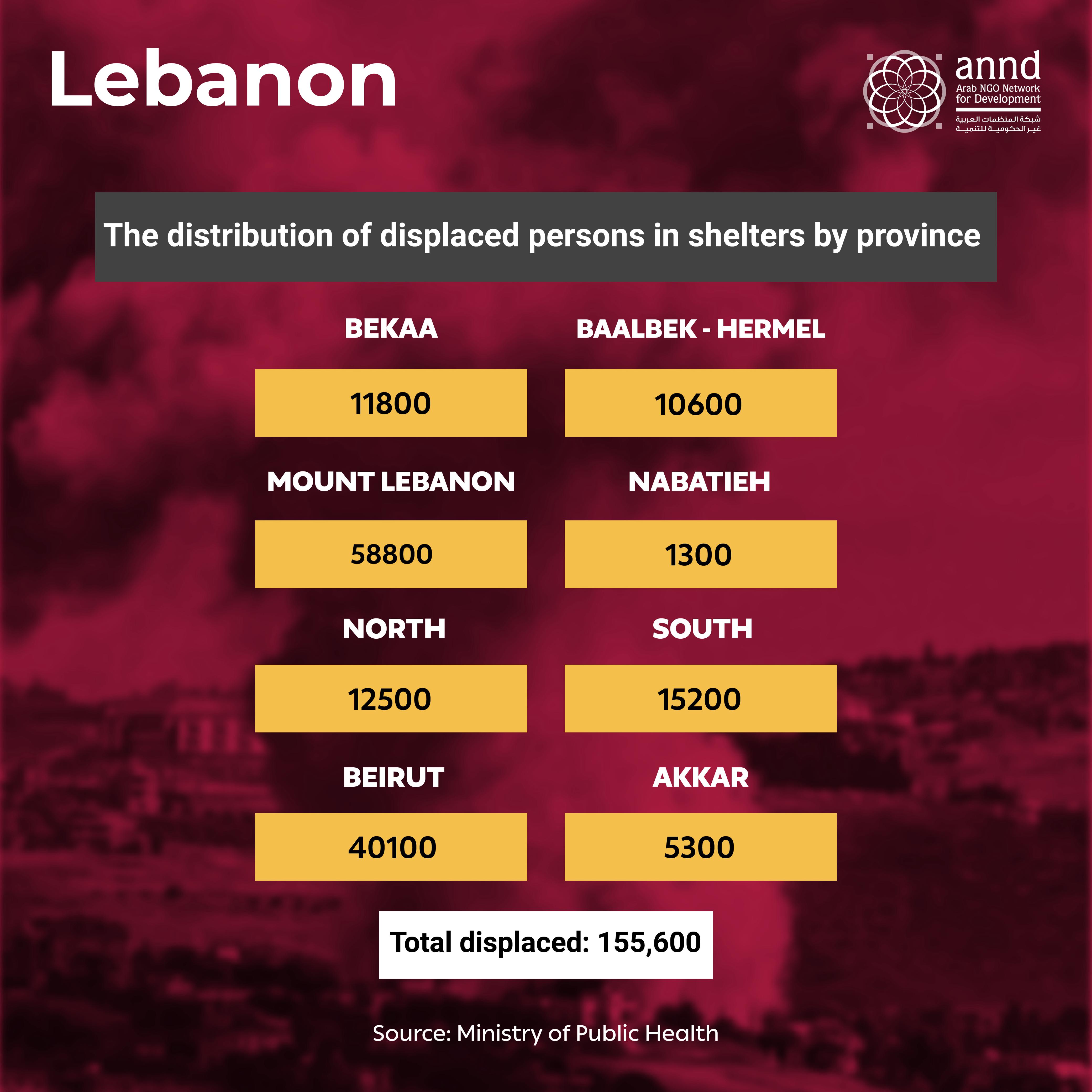
According to a statement from UNICEF, thousands of children and families are now living in the streets or in shelters, many having fled their homes without their basic necessities or belongings. The humanitarian conditions will continue to worsen over time.
In this context, the United Nations and the Lebanese government issued an urgent appeal for $426 million to respond to the needs of civilians affected by the escalation of conflict in Lebanon.
Speaking to reporters in Geneva, Jens Laerke, spokesperson for the UN Office for the Coordination of Humanitarian Affairs (OCHA), expressed deep concern over reports that the Israeli ground invasion of southern Lebanon has begun. He said the appeal was for "known needs, but we fear that with these developments, things may worsen."
Christian Cortez, head of the International Federation of Red Cross and Red Crescent Societies delegation in Lebanon, stated that the Lebanese Red Cross has been working around the clock and has responded to thousands of medical emergencies. However, they face a shortage of medical supplies, ambulances, fuel, and a severe lack of funding. He mentioned that the Federation allocated two million Swiss francs last Monday as part of its disaster response, but the overall appeal for 55 million Swiss francs remains only 12 percent funded.
Calls for a Ceasefire
In a statement released on Tuesday, the United Nations Interim Force in Lebanon (UNIFIL) confirmed that peacekeeping forces remain stationed in their positions despite the serious development that the Israeli army has notified UNIFIL of its intention to conduct limited ground incursions into Lebanon. The statement emphasized that any crossing into Lebanon would "constitute a violation of Lebanese sovereignty and territorial integrity and a breach of Resolution 1701."
United Nations Secretary-General António Guterres also expressed grave concern over the escalation of the conflict in Lebanon. He called for an immediate ceasefire and stressed, during his conversation with the Prime Minister of Lebanon, that the entire United Nations system in Lebanon is mobilizing efforts to assist all those in need of support. The UN Secretary-General also channeled these concerns to the international community to urgently support the humanitarian appeal launched today in Beirut.
The UN High Commissioner for Human Rights expressed deep concern about the escalating hostilities in the Middle East and the potential for the entire region to be plunged into a humanitarian and human rights catastrophe. There are fears that a large-scale Israeli ground invasion could lead to even greater suffering.
Meanwhile, a number of UN experts called for an immediate cessation of hostilities and the protection of civilians. They condemned Israel for using the same devastating violence it applied in Gaza in its attacks on Lebanon, noting that the escalation and expansion of attacks on civilians is part of a genocidal campaign against the Palestinian people, as affirmed by the International Court of Justice ruling in April of this year, especially in Gaza.
The European Union's foreign policy chief reiterated the call for an immediate ceasefire and lamented the heavy civilian casualties in Lebanon, urging respect for international humanitarian law.
In parallel, Turkey’s Ministry of Foreign Affairs stated that Israel’s launch of a ground offensive in Lebanon constitutes a violation of its sovereignty and territorial integrity, considering what is happening an illegitimate attempt to occupy Lebanon.
In a press conference, the British Foreign Secretary affirmed Israel's right to self-defense and urged British nationals to leave Lebanon as soon as possible.
The Lebanese Prime Minister received calls from Italian Prime Minister Giorgia Meloni, the Qatari Foreign Minister, and the Jordanian Foreign Minister and Minister of Expatriates Affairs, expressing their ongoing diplomatic efforts to stop the fighting and protect civilians, as well as their readiness to provide all necessary support to the Lebanese people.
Iran's Direct Entry into Military Escalation
Iran fulfilled its threat to respond to the assassination of Ismail Haniyeh, Hassan Nasrallah, and the deputy commander of the Iranian Revolutionary Guard, who were killed in Beirut, by launching hundreds of ballistic missiles at Israel. The missiles targeted a military airport reportedly used by Israel to receive U.S. military aid, as well as the Mossad headquarters and several military bases in various parts of southern and central Israel. No human casualties were reported, except for the death of a young Palestinian man caused by the fall of an unarmed missile.
Following the Iranian bombardment, the Israeli army spokesperson stated that the response will come at the time and place of Israel's choosing. Israeli officials had previously indicated that the response could target Iran’s nuclear facilities and military sites, including the assassination of spiritual and political leaders.
Some Iraqi armed factions also announced their readiness to enter the war if Iran is targeted.
Gaza: The Daily Scene of Violence and Bloodshed
Reports indicate that Israeli bombing operations by land, sea, and air continue across Gaza, resulting in more civilian casualties, displacement, and destruction of homes and other civilian infrastructure. Ground operations continue, particularly in Beit Hanoun, Beit Lahia, southern Gaza City, and around the Nuseirat refugee camp, as well as in Deir al-Balah, Khan Younis, and Rafah.
Israeli airstrikes killed at least 31 people in Gaza on Tuesday. The Ministry of Health in Gaza announced that the death toll from the Israeli assault since October 7 has reached 41,638, with 96,460 wounded. Palestinian health officials reported that at least 13 people, including women and children, were killed in two Israeli airstrikes on homes in Nuseirat, one of the eight historic refugee camps in Gaza.
An airstrike on a school sheltering displaced Palestinian families in the al-Tuffah neighborhood of Gaza City killed at least seven people. Later on Tuesday, two separate Israeli airstrikes killed five Palestinians in Rafah in the southern Gaza Strip and in the al-Zaytoun neighborhood of Gaza City. Six Palestinians were killed in Khan Younis in the southern Gaza Strip in an airstrike on a tent sheltering displaced persons.
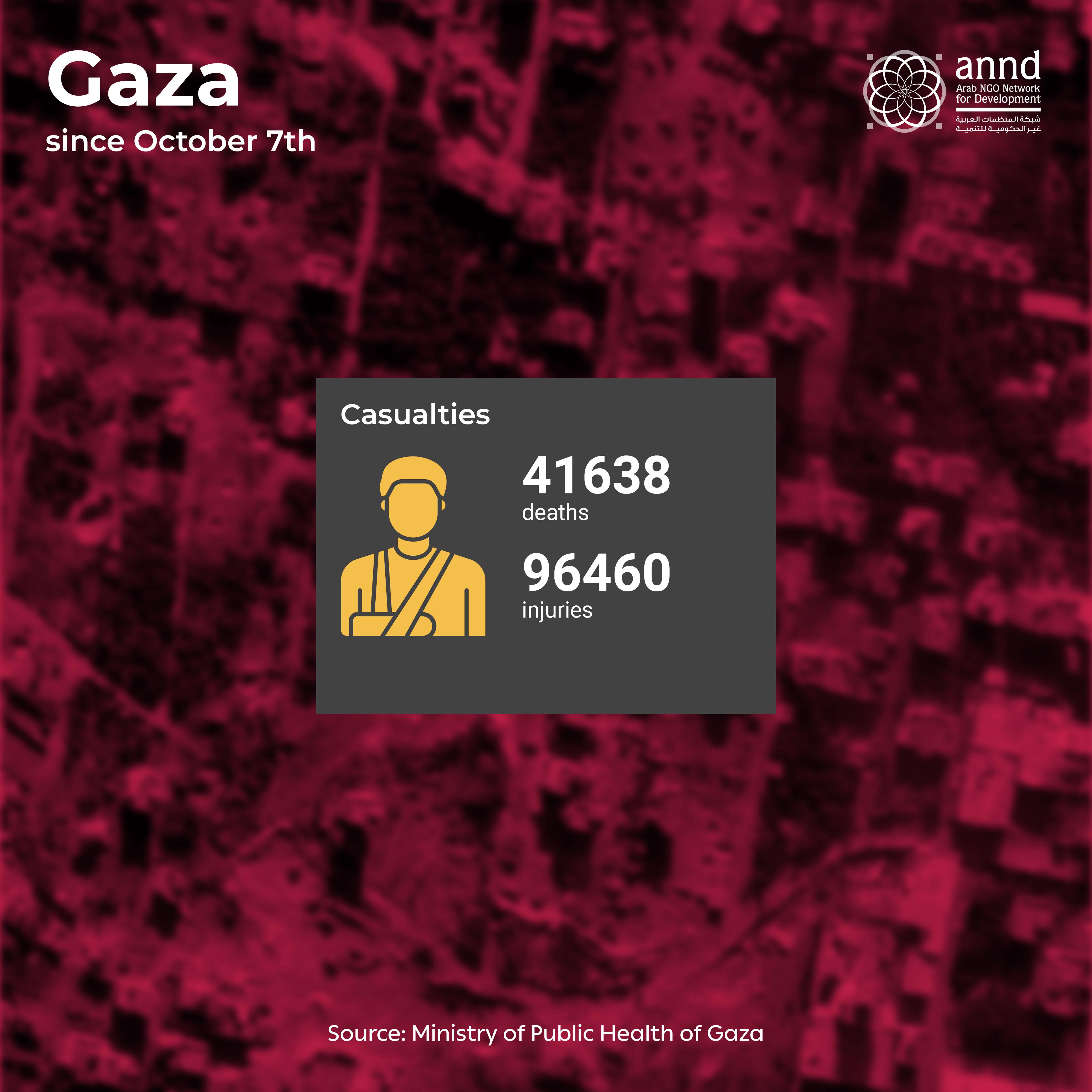
According to a summary of humanitarian updates from the UN Office for the Coordination of Humanitarian Affairs in the occupied Palestinian territories:
- It will not be possible to meet the urgent needs of more than 2.1 million people during the rainy season unless humanitarian aid is allowed to reach Gaza unhindered across all its regions.
- The education sector’s working group warns that many of the 215 temporary learning spaces serving nearly 34,000 children are now at risk of serious damage from the upcoming floods.
- Humanitarian organizations are providing nearly 600,000 meals daily across Gaza. However, the food security sector reports that more than 1.4 million people did not receive their food rations in September due to dwindling supplies.
- According to the food security sector, only four out of 37 olive presses in Gaza are currently operational, and over a million olive trees have been uprooted since October 2023.
- The World Bank announced that poverty levels among Gaza's population have risen to nearly 100 percent, up from 64 percent before the escalation of hostilities.
As the rainy season approaches, the already dire living conditions in Gaza will worsen, putting hundreds of thousands of residents at risk of further displacement, loss of assets, health hazards, and limited access to basic essential needs and services. The United Nations and humanitarian partners have developed a winter-preparedness plan aimed at meeting the urgent needs of over 2.1 million people in Gaza during the winter months, including more than 850,000 people in 49 neighborhoods located in flood-prone areas. The plan, which is a subset of the emergency appeal for the occupied Palestinian territories, requires $242 million to implement a wide range of urgent interventions, with a particular focus on vulnerable groups, including women-headed households, children, people at risk of violence (including gender-based violence), the elderly, people with disabilities, and those with chronic illnesses.
